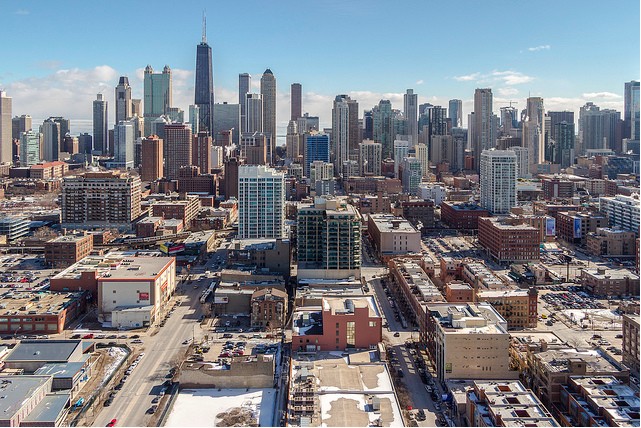Chicago Ranks Eighth In Income Inequality Amongst U.S. Cities
By Jon Graef in News on Mar 9, 2014 3:30PM
According to a recent study by the Brookings Institute, Chicago ranked eighth in income inequality amongst 50 cities in the United States. Based on census data, Chicago's richest 5 percent earned $201,460, while those in the poorest 20 percent earned $16,078.
The city with the highest income inequality was Atlanta, GA, while the city with the lowest income inequality was Virginia Beach, VA.
The findings from the Brookings Institute come from a recently published study called, "All Cities Are Not Created Unequal."
In a post explaining the study's findings, Alan Berube, the institute's senior fellow and deputy director of its Metropolitan Policy Program, specifically name-checked Chicago, saying that the issue of income inequality would "no doubt be a central issue" in the next mayoral election. (That is, if there's a viable candidate who can run against Mayor Emanuel, no disrespect to Amara Enyia.)
Berube then explains the stakes surrounding income inequality for a modern city.
Inequality may be the result of global economic forces, but it matters in a local sense. A city where the rich are very rich, and the poor very poor, is likely to face many difficulties. It may struggle to maintain mixed-income school environments that produce better outcomes for low-income kids. It may have too narrow a tax base from which to sustainably raise the revenues necessary for essential city services. And it may fail to produce housing and neighborhoods accessible to middle-class workers and families, so that those who move up or down the income ladder ultimately have no choice but to move out.
Or, as Columbia Chronicle Metro Editor Maria Castellucci explained, "Income inequality results in poor performing schools, lower city tax revenue and reduced employment and housing options for middle- and low-income households, forcing them to leave the city...".
Back to Berube for a moment. In his post, Berube said the way to measure income inequality is by using the 95/20 ratio. That is, take the income that a city's top 5 percent of income earners earn ("a household [which] earns more than 95 percent of all other households") and divide it against the income of a city's bottom 20 percent of income earners.
And there's your income inequality ratio. Chicago has an income inequality ratio of 12.5. That number may seem high, but consider that Atlanta has an income inequality ratio of 18.8. San Francisco, the city in second place, has an income inequality ratio of 16.6. New York, sixth place, has an income inequality ratio of 13.2.
Of course, in a major metropolitan city, some income inequality is inevitable. That's because cities like Chicago offer high-and-low income jobs alike, which in turn attracts a wide range of people.
Here's what Howard Wial, executive director of the Center for Urban Economic Development at the University of Illinois at Chicago, told Castellucci.
Wial said factors such as tax rate reductions for the rich and the $7.25 federal minimum wage facilitate inequality. Wial said local minimum wages and the scarcity of sustainable jobs for people without a college degree lead to inequality because there are fewer opportunities for low-income residents.“Policies that help create … good jobs for people who don’t have bachelor’s degrees are helpful,” Wial said. “The efforts that are just getting started around here … could be helpful, but we haven’t had much of that in the past decade or earlier.”
...
Although Chicago appears unequal, Wial said high inequality is to be expected because it characterizes the nature of a city. Cities offer both high-income jobs and minimum-wage jobs, which attracts a diverse demographic.
“Even in the best possible world, where inequality was as low as you could ever imagine it could be, places like Chicago would still have more inequality than places like Peoria, Ill.,” Wial said. “The fact that Chicago looks relatively bad in terms of inequality is not necessarily Chicago’s fault and not necessarily a flaw in the functioning of the economy.”
So some income inequality is normal. The key word, however, is "some."
Wial said there haven't been many policies to help in the past 10 years. Berube said, "[o]ver the past 35 years, members of the [top 5 percent ] have generally experienced rising incomes, while those in the [bottom 20 percent] have seen their incomes stagnate."
Further, those in the bottom 20 percent spend more time per week commuting to and from their lower paying jobs, which results in lost wages and more money spent on child care. No wonder Chicago lost 200,000 residents to the suburbs.
But all hope is not lost. After all, consider Berube's concluding paragraph.
Large populations, diverse housing types, and generally progressive politics mean that most cities will always have higher shares of the rich and poor than smaller places. But the contemporary causes and consequences of inequality in cities vary greatly across the national map. Mayors who want to promote both economic diversity and economic mobility in their cities should take note.
If only we didn't get the feeling that such an appeal falls on deaf ears.
